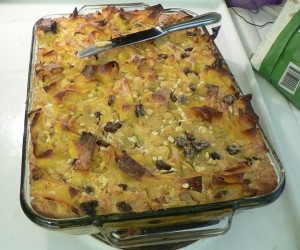Witnesses reported the presence of both grandmothers in the room at the time.

Credit: Stuart Spivack via Wikimedia Commons
Jerusalem, May 8 – The four-year-old child of a man and woman whose respective ancestries hail from different parts of eastern Europe, and whose grandmothers therefore bring different sensibilities to similarly-named and similarly-conceived dishes, has pronounced his paternal grandmother’s kuggel tastier this his maternal grandmother’s kiggel, family sources reported today.
Preschooler Ariel Yehuda Greenberg responded to an uncle’s in-jest inquiry as to the difference between the two noodle puddings, which often differ in little but pronunciation. “What’s the difference between kuggel and kiggel?” wondered the teasing relative, under the assumption that the two terms signify the equivalent item of cuisine, differing only in regional pronunciation. The boy, however, gave the question a few seconds’ thought before answering, “Kuggel tastes better.” Witnesses reported the presence of both grandmothers in the room at the time.
Professor of Linguistics Phil Landerer of the Hebrew University noted that while difference in pronunciation of certain Yiddish words correlates closely with certain culinary sensibilities, the passage of time and intermingling of Yiddish subcultures over the last two centuries has weakened the association “To nineteenth-century Jews of Poland and Russia ‘kuggel’ and ‘kiggel’ might refer to a savory or sweet pudding, respectively, that distinction no longer holds true as often,” he explained. “Both are the same word, but in the Galician, as opposed to Lithuanian, dialect, the vowel sounds you hear in book, good, tool, and spook, for example, become a long ‘e’ as in feed and speak. Once upon a time that also mapped to a difference in recipe, since the sugar beet industry took root, ha-ha, in Poland, but further east they were still making savory noodle kuggel.”
Professor Landerer pointed to a similar phenomenon with gefilte fish, with Litvak sensibilities calling for a savory preparation and Galitzianers preferring sweet. “In this case, though, the family traditions have already deviated markedly from that historical situation,” he observed. “The kuggel-kiggel divide used to be more or less congruent with the eastern vs. western Yiddish dialect divide. Not anymore. My parents, for example, intermarried: my mother grew up in Brooklyn, a Dodgers fan, whereas my father’s parents in Queens raised him a staunch partisan of the Giants. You can imagine the scandal, I’m sure. Me, I root for the Mets, even from six thousand miles away, because even after those two teams moved to the West Coast, there is no way I would ever give my allegiances to the Yankees.” He spat as pronounced the last word.
Please support our work through Patreon.




